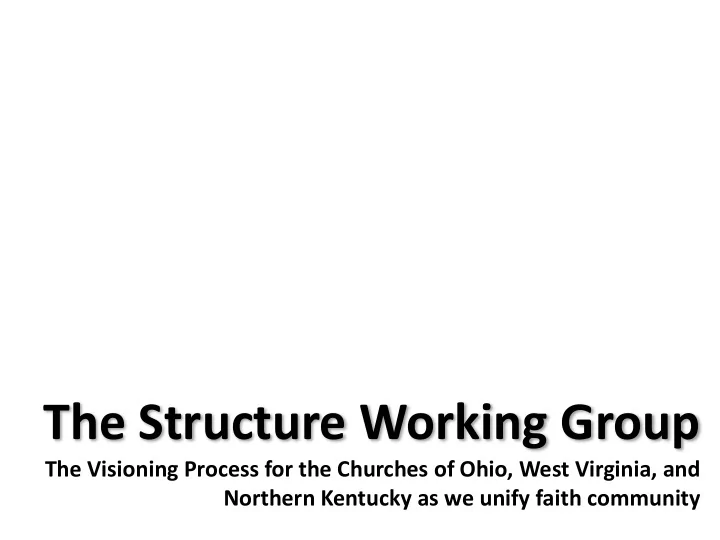

The Structure Working Group The Visioning Process for the Churches of Ohio, West Virginia, and Northern Kentucky as we unify faith community
Form First, or Function? • Louis Sullivan “Form ever follows Function” • What an object or system is going to be doing dictates how it must be constructed • Think of practical examples in your life: A teapot with no spout is a poor teapot A train car with no wheels won’t travel A bicycle with square tires will get tired fast • So too are our organizational structures
Structure & Mission: A Relationship • For many years in the Ohio Conference, Structure has determined our Mission • “How We are Organized” has been the limiting factor of how missionally connected we can be • We believe God calls us to a Mission that dwarfs our current organizational structure • We believe our Mission ought to drive our Structure — not the other way around
That They May All Be One (Judicatory) • There will be one unified Judicatory • The Judicatory is the organizational setting that makes connections between the local church and the national setting • The Judicatory will have a Leadership Board elected at an annual meeting of the UCC faith community in this area • This Judicatory unifies the existing Associations (CSEOA, EOA/WRA, NWOA, SONKA) and the Ohio Conference into One Body
The Leadership Board • Oversees & assists the development of 3 support centers (physical plants, finances, staff) • Assumes responsibilities of current conference Board of Directors and much of what is done by the governing bodies of the associations • Includes all Executive & Ministerial staff • Appropriately & faithfully reflects the diversity of the congregations and people throughout the wider setting of the UCC in this area • Includes a Leadership Development Team to identify persons for future service on the board & assist in developing the gifts for leadership
Called Positions Part I: Area Ministers • Based in each of the Support Centers • Responsible for health & well-being of the congregations within their support area • Will resource Committees on Ministry, Search and Call, and provide pastoral care to authorized ministers & congregations • Will work in partnership with other Area Ministers supporting each other • Each will have a specialty responsibility for work in the entire judicatory (i.e. Committees on Ministry, Search and Call, Lay School, etc.)
Called Positions Part II: Executive Minister • Supports Area Ministers by – Supervising area service staff – Assuring collaboration and sharing of resources in the Support Centers – Representing the entire territory in ecumenical and national UCC settings – Assuring the evaluation of Area Ministers by Support Center advisory boards • Will be a specialist in at least one essential ministry (i.e. Generosity Development, Church Vitality, New Church Development, Prophetic Witness, Faith Formation, etc.)
Called Positions Part III: Possibilities • Additional short term or long-term specialists in other essential ministries as determined by the Board – May be full-time – May be part-time – May be volunteer • All staff are considered all-Judicatory staff • All decision-making around additional called positions will be accomplished cooperatively & be led by the Leadership Board
Appointed Positions • All administrative, financial, and support persons as needed • Will function within a team but may be dispersed physically as mission leads • Hired and supervised by Area Ministers or the Executive Minister within defined budget parameters in collaboration with the Leadership Board • May differ in configuration by support area as mission & needs dictate
Perceived Advantages to the Proposal • Focuses first on collaboration & unified purpose , then on how structure allows for collaboration • Reduces overlapping tasks & fills gaps by sharing ministry across the geographic territory • Permits a more efficient administrative structure that will yield greater investment in essential ministries • Allows specialists to thrive in their settings • Expands time the Area Ministers in the support centers have for pastoral ministry by reducing administrative responsibilities
Comments and Questions • All of this is a proposal — not a final system set in stone • Your feedback will shape the next iteration of this design • No question is out of bounds • No idea is beyond consideration • God calls us to dream big today! • What Comments and Questions do you hear a still-speaking voice naming for you?
Closing Prayer (NCH #875) Jesus said, “You ought always to pray and not to faint.” Do not pray for easy lives; pray to be stronger women and men. Do not pray for tasks equal to your powers, but for power equal to your tasks. Then, the doing of your work will be no miracle — you will be the miracle. Every day you will wonder at yourself and the richness of life which has come to you by the grace of God. Amen!
Recommend
More recommend